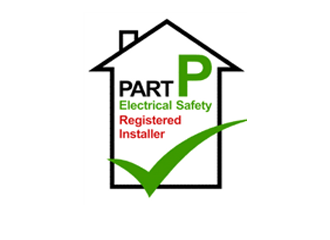WHAT IS PART P REGISTERED? And what does it mean for me?…
This is an important question we get asked at Fylde Coast rewires all the time. Simply it means that the electrician or electrical contracting company that is carrying your electrical work out can sign off your work with your local council building control.
Most domestic electrical work carried out in England and Wales since 2005 falls under Part P of the Building regulations PART P. The idea behind this was to improve the standards of electrical installation work across England and Wales. If electrical work has been carried out to British standards (b.s.7671) for electrical work then ALL installations should be accompanied by one of two certificates, either a minor works certificate or an Electrical Installation Certificate. It had been noted that too many consumers and householders were having poorly installed electrical installations with no paperwork or guarantees in place. This prompted the British Government to include electrical installations within the building regulations.
Following on from this introduction there was a number of electrical industry schemes where the electrician or electrical contractor could register under the Competent person scheme (CPS)www.niceic.com/householder/findacontractor. This enabled electricians to demonstrate competency within the industry so they can Self Certify their work with the local Council building Control. Some of the scheme’s electricians can register with are
NICEIC – www.niceic.com
NAPIT – www.napit.org.uk
The NICEIC are probably the most recognised of the scheme providers and who Fylde Coast rewires are registered with.
Typical electrical work that is carried out and is notifiable under Part P of the building regulations are the following
- The Installation of a new circuit
- The replacement of a consumer unit/fuse box
- Any additional or alterations to circuits in a special location such as a bathroom/shower room.
If you are having your Fylde Coast property rewired then this will most definitely fall under Part P of the building regulations. Your electrical rewire will be having all of the listed works above carried out during the rewire.
It is advisable before any electrical work is carried out which certifying body is the electrician or contractor registered with. Each registration carries a membership number which can be checked with the registering body if you are unsure.
On completion of any electrical installation work that falls under the above Part P registration you should receive two certificates. One will be the Electrical installation certificate and the other will be the Part P certificate which will detail work carried out, who the contractor was that carried the work out and the date the work was completed along with the electrical installation certificate number associated with the work. It is important you receive these certificates as it will be difficult to sell or insure your property without these important documents.
If you choose not to use a registered electrician, then your work can still be signed off through your local councils building control. The fee for this differs from council to council although we would budget between £300-£400. They will still ask for the relevant electrical certificates and may also wish to visit the works during installation. Choosing this option obviously can cause delays and disruption to your project and add extra costs to it also.
